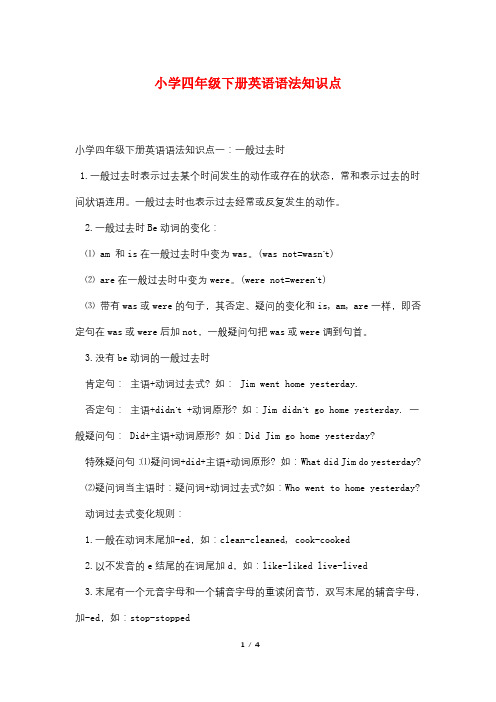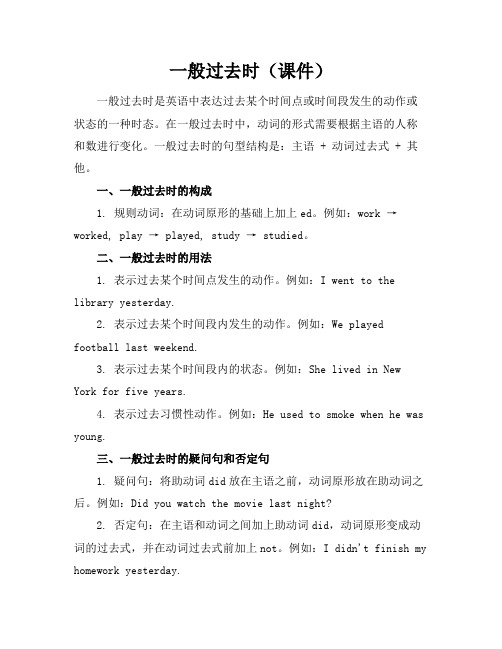深圳小学英语四年级下册:一般过去时(易教易学)
- 格式:doc
- 大小:38.05 KB
- 文档页数:5


(完整word版)一般过去时一般过去时一.一般过去时口诀:1.一般过去时并不难,表示过去动作、状态记心间。
2.动词要用过去式,时间状语句末站。
3.否定句很简单,didn't 站在动词原形前,其它部分不要变。
4.一般疑问句也好变,did放在句子前,主语、动原、其它部分依次站。
5. 特殊疑问句也简单,疑问词加一般疑问句记心间。
6. 最后一条请注意,动词过去二.一般过去时的结构(可分三类不同的结构)概念:一般过去时用来表示过去某一时间内发生的动作或存在的状态以及过去习惯性、反复性的动作。
谓语动词要用动词的过去式,常和表示过去的时间状语连用,如yesterday昨天、last night昨晚、last week上周、last year去年等。
Be动词的一般过去时在没有实义动词的句子中使用be动词,am is 的过去式为was; are的过去式为were肯定句式:主语+ be(was , were) + 其它.否定句式:主语+ be(was , were) + not + 其它.一般疑问句:Be(was , were) + 主语+ 其它?注:在这种构成中,be动词有人称和数的变化,即要根据主语选用was / were。
Be动词分为单数和复数,was是表示单数,were是表示复数。
2实义动词的一般过去时态肯定句要使用动词的过去式,否定句和疑问句要使用助动词do和does 的过去式did.肯定句式:主语+ 动词(过去式)+ 其它否定句式:主语+ didn’t + 动词(原形)+ 其它【did not = didn’t】一般疑问句:Did + 主语+ 动词(原形)+ 其它【do , does的过去时均为did】?注1. did和didn’t 是构成一般过去时的助动词,其特点是要在其后跟动词的原形。
2. 实意动词do的一般过去时I do my homework every day.(用yesterday改写句子)I did my homework yesterday.I didn’t do my homework yesterday.(否定句)Did you do your homework yesterday?Yes ,I did. /No, I didn’t.(一般疑问句)3情态动词的一般过去时态情态动词的过去式:can→could , may→might , must→must ,will-would,should-should。

小学四年级下册英语语法知识点小学四年级下册英语语法知识点一:一般过去时1.一般过去时表示过去某个时间发生的动作或存在的状态,常和表示过去的时间状语连用。
一般过去时也表示过去经常或反复发生的动作。
2.一般过去时Be动词的变化:⑴ am 和is在一般过去时中变为was。
(was not=wasn’t)⑵ are在一般过去时中变为were。
(were not=weren’t)⑶ 带有was或were的句子,其否定、疑问的变化和is, am, are一样,即否定句在was或were后加not,一般疑问句把was或were调到句首。
3.没有be动词的一般过去时肯定句:主语+动词过去式? 如: Jim went home yesterday.否定句:主语+didn’t +动词原形? 如:Jim didn’t go home yesterday. 一般疑问句: Did+主语+动词原形? 如:Did Jim go home yesterday?特殊疑问句:⑴疑问词+did+主语+动词原形? 如: What did Jim do yesterday?⑵疑问词当主语时:疑问词+动词过去式?如:Who went to home yesterday? 动词过去式变化规则:1.一般在动词末尾加-ed,如:clean-cleaned, cook-cooked2.以不发音的e结尾的在词尾加d,如:like-liked live-lived3.末尾有一个元音字母和一个辅音字母的重读闭音节,双写末尾的辅音字母,加-ed,如:stop-stopped4.以“辅音字母+y”结尾的,变y为i,再加-ed,如:study-studied 但play-played5.不规则动词过去式:am, is-was, are-were, do-did, see-saw, get-got, go-went, come-came, have-had, eat-ate, take-took, sing-sang, put-put, make-made, read-read, write-wrote, draw-drew, fly-flew, swim-swam小学四年级下册英语语法知识点二:一般现在时一般现在时的功能1.表示事物或人物的特征、状态。

四年级英语过去式的整理以下是为您整理的 20 个四年级常见的英语过去式相关内容:---## 一、单词1. **is - was** :是(单数)- 英语释义:Used to express the past tense of the verb 'be' for the third person singular.- 短语:was late 迟到- 例句:He was happy yesterday. (他昨天很开心。
)2. **are - were** :是(复数)- 英语释义:The past tense of 'are', used for the second person singular and all persons plural.- 短语:were at home 在家- 例句:We were busy last week. (我们上周很忙。
)3. **do - did** :做- 英语释义:The past tense of the verb 'do', used to express an action in the past.- 短语:did homework 做作业- 例句:She did her best. (她尽了最大努力。
)4. **go - went** :去- 英语释义:The past tense of 'go', indicating movement to a place in the past.- 短语:went shopping 去购物- 例句:They went to the park. (他们去了公园。
)5. **have - had** :有;吃;喝- 英语释义:The past tense of 'have', used to express possession, experience or consumption in the past.- 短语:had breakfast 吃早餐- 例句:I had a great time. (我玩得很开心。


一般过去时(课件)一般过去时是英语中表达过去某个时间点或时间段发生的动作或状态的一种时态。
在一般过去时中,动词的形式需要根据主语的人称和数进行变化。
一般过去时的句型结构是:主语 + 动词过去式 + 其他。
一、一般过去时的构成1. 规则动词:在动词原形的基础上加上ed。
例如:work → worked, play → played, study → studied。
二、一般过去时的用法1. 表示过去某个时间点发生的动作。
例如:I went to the library yesterday.2. 表示过去某个时间段内发生的动作。
例如:We playedfootball last weekend.3. 表示过去某个时间段内的状态。
例如:She lived in New York for five years.4. 表示过去习惯性动作。
例如:He used to smoke when he was young.三、一般过去时的疑问句和否定句1. 疑问句:将助动词did放在主语之前,动词原形放在助动词之后。
例如:Did you watch the movie last night?2. 否定句:在主语和动词之间加上助动词did,动词原形变成动词的过去式,并在动词过去式前加上not。
例如:I didn't finish my homework yesterday.四、一般过去时的特殊用法1. 过去进行时:表示过去某个时间点正在进行的动作。
例如:What were you doing at 8 o'clock last night?2. 过去完成时:表示在过去某个时间点之前已经完成的动作。
例如:I had finished my work before he came.3. 过去完成进行时:表示在过去某个时间点之前一直在进行的动作。
例如:She had been waiting for two hours when he finally arrived.一般过去时(课件)一般过去时是英语中表达过去某个时间点或时间段发生的动作或状态的一种时态。
一般过去时1、概念表示在过去某个时间里所发生的动作或存在的状态。
通常在句子里找到表示过去时间的词或词组。
如:yesterday,yesterday morning/ evening,the day before yesterday(前天),last night/week/ month/year,just now(刚才),two days ago,a week ago,in 1990等。
如:I went to bed at eleven last night. 昨晚我11:00睡觉。
2、动词一般过去时变化规则1.一般在动词末尾加-ed,如:pull-pulled, cook-cooked, play- played2.结尾是e加d,如:taste-tasted3.末尾只有一个元音字母和一个辅音字母的重读闭音节,应双写末尾的辅音字母,再加-ed,如:stop-stopped,plan-planned, prefer-preferred4.以“辅音字母+y”结尾的,变y为i,再加-ed,如:study-studied5.小学阶段不规则动词一般过去时:am/is→was are→were have/has→had do→didsing→sang sit→sat give→gave run→ran come→came eat→atetake→took write→wrote ride→ rode drive→drove speak→spoke get→gotgo→went make→made know→knew see→saw teach→taught buy→boughtread→read put→put hurt→hurt cut→cutfall→fell say→said3、句式变化(1) Be动词在一般过去时中的变化1) am 和is在一般过去时中变为was。
(was not=wasn’t)2) are在一般过去时中变为were。
小学英语语法:一般过去时编辑整理:尊敬的读者朋友们:这里是精品文档编辑中心,本文档内容是由我和我的同事精心编辑整理后发布的,发布之前我们对文中内容进行仔细校对,但是难免会有疏漏的地方,但是任然希望(小学英语语法:一般过去时)的内容能够给您的工作和学习带来便利。
同时也真诚的希望收到您的建议和反馈,这将是我们进步的源泉,前进的动力。
本文可编辑可修改,如果觉得对您有帮助请收藏以便随时查阅,最后祝您生活愉快业绩进步,以下为小学英语语法:一般过去时的全部内容。
一般过去时I. 一般过去时的概念一般过去时表示过去某个时间发生的动作或存在的状态。
常和表示过去的时间状语连用.如: last week ,last year, yesterday等;也可表示过去经常反复发生的动作,常和often,always等频率副词连用。
例如:①I saw him in the supermarket yesterday。
昨天我在超市里看见他了。
②Li Mei always went to school on foot last term. 上学期李梅总是步行上学。
II. 一般过去时的构成我们主要来学习谓语动词为实义动词的一般过去时的构成。
动词过去式的构成:1、规则动词过去式的构成有四条规则:①一般在动词原形末尾直接加上-ed。
如:look—looked,learn—learned.②以不发音的字母e结尾的动词,去e再加—ed。
如:live—lived,like—liked.③末尾只有一个辅音字母的重读闭音节,先双写这个辅音字母,再加-ed。
如:stop—stopped,。
④末尾是辅音字母+y结尾的动词,先变y为i,然后再加-ed。
如:study-studied,fly-flied。
2、不规则动词的过去式需特殊记忆。
如:am(is)-was, are—were, go—went, come-came,take-took, have (has)-had,swim—swam,run—ran,make-made等。
一般过去时Part Ⅰ一.背诵重点词汇:lab=laboratory实验室stair楼梯hotel旅馆spaceship宇宙飞船machine机器Earth地球telephone电话upstairs在楼上try尝试DVD player数码影像光盘播放机in the future将来in space在太空/宇宙the Space Hotel太空旅馆walk in space 太空漫步fly to the sky飞向太空a fun holiday有趣的假期see the stars看星星二、默写以上重点单词Part Ⅱ★一般过去时★1、概念表示在过去某个时间里所发生的动作或存在的状态。
通常在句子里找到表示过去时间的词或词组。
如:yesterday,yesterday morning/ evening,the day before yesterday(前天),last night/week/ month/year,just now(刚才),two days ago,a week ago,in 1990等。
如:I went to bed at eleven last night. 昨晚我11:00睡觉。
2、动词一般过去时变化规则1.一般在动词末尾加-ed,如:pull-pulled, cook-cooked, play- played2.结尾是e加d,如:taste-tasted3.末尾只有一个元音字母和一个辅音字母的重读闭音节,应双写末尾的辅音字母,再加-ed,如:stop-stopped,plan-planned, prefer-preferred4.以“辅音字母+y”结尾的,变y为i,再加-ed,如:study-studied5.小学阶段不规则动词一般过去时:am/is→was are→were have/has→had do→didsing→sang sit→sat give→gave run→ran come→came eat→atetake→took write→wrote ride→ rode drive→drove speak→spoke get→gotgo→went make→made know→knew see→saw teach→taught buy→boughtread→read put→put hurt→hurt cut→cutfall→fell say→said3、句式变化(1) Be动词在一般过去时中的变化1) am 和is在一般过去时中变为was。
(was not=wasn’t)2) are在一般过去时中变为were。
(were not=weren’t)3) 带有was或were的句子,其否定、疑问的变化和is, am, are一样,即否定句在was或were后加not,一般疑问句把was或were调到句首。
(2)句中没有be动词的一般过去时的句子Jim does homework every day.Jim did homework yesterday.否定句:Jim did homework yesterday.Jim didn't do homework yesterday. (didn't +动词原形)一般疑问句:Jim did homework yesterday.Did Jim do homework yesterday? (在句首加did,句子中的动词过去式变回原形)特殊疑问句:Jim did homework yesterday.Did Jim do homework yesterday?What did Jim do yesterday? (疑问词+一般疑问句?)综合练习一、写出下列动词的一般过去时is\am________ study_______ plant________ are ________ play_______go________ does_______ help ________ ask ________ watch ________eat__________ put ______ read_________ make ________ have________do ________ has_________ come _________sit ________ run________二、选择题( ) 1. We ______ an English play a moment ago.A. seeB. seesC. saw( ) 2. Liming ________ last Sunday morning.A. cut hairB. cuts hairC. is cutting( ) 3. He ________ the clothes yesterday.A. didn’t washB. didn’t washedC. don’t washed( ) 4. It ______ a windy day yesterday.A. isB. wasC. am( ) 6. He ______ his grandparents last Sunday.A. visitB. visitedC. visits( ) 7. Where did you go _______?A. tomorrowB. nowC. just now( ) 8. – Did you play football? -- Yes. I ________ football.A. playB. playsC. played( ) 9. __________you__________ to school last Sunday?A. Did, comeB. Do, comeC. Were, come( ) 10. ______ he ______ football last weekend?A. Did, playedB. Did, playC. Did, plays三、用单词的适当形式填空1. He _________ (be) in Wuxi two years ago.2. She ________(read) a comic book last night.3. We _______ (have) a party last Christmas.4. We _______ (go) hiking last Sunday.5. I ________ (make) a model ship with Mike yesterday.6. They ________ (play) chess in the classroom last PE lesson.7. Rose ________ (do) homework the day before yesterday.8. What _______ (do) you _______ (do) two hours ago?9. John was late for class this morning because he _______ (get) up late.10. The children ________ (be) excited just now.四、句型转换1. Su Hai did his homework last night.否定句:________________________________________________一般疑问句:____________________________________________肯、否定回答:__________________________________________2. Nancy went to school early this morning.否定句:________________________________________________一般疑问句:____________________________________________肯、否定回答:__________________________________________3. We sang some English songs.否定句:________________________________________________一般疑问句:____________________________________________肯、否定回答:__________________________________________4. Danny was in the library just now.否定句:________________________________________________一般疑问句:____________________________________________肯定、否定回答:_________________________________________「consolidation homework工作纸、测试卷」根据中文意思和英文提示完成句子。
1. 昨天是他的朋友在照看他的弟弟。
(look after)His friend ________ _________ ________ his brother yesterday.2. 我们上周五看了一部电影。
We _____________ a film ____________ _______________.3. 他在音乐课上拉小提琴了吗?不,没有。
______ he _______ _______ ________ at the ________ lesson? No, he _______.4. 你们上个儿童节做了什么?我们去了动物园。
What ______ you _____ last ______________ ___________? We ________ ______ the zoo.5. 你上周在哪儿? 我在家里。
--Where _________ you _______ __________?--I _________ at home.。